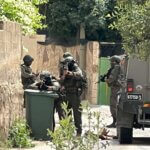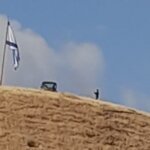Amnesty International call for urgent action against against demolitions in Al Hadidiya
UA: 194/11 Index: MDE 15/028/2011 Israel/OPT Date: 22 June 2011
https://www.amnesty.org/en/documents/mde15/028/2011/en/
URGENT ACTION: FAMILIES WITHOUT HOMES FOLLOWING DEMOLITION
The Israeli army have destroyed 29 homes and other properties in the Bedouin hamlet of Hadidiya in the Jordan Valley, leaving 11 children and 16 adults without homes. The families are planning to rebuild structures to live in, but these will also be at immediate risk of demolition by the authorities.
On 21 June at 6.30am, Israeli military and security officials, including two Civil Administration (Israeli military administration) officers, an estimated one hundred soldiers, and members of the Israel Border Police arrived in the Hadidiya area with two bulldozers. They demolished some seven tents, four structures serving as kitchens and 18 pens housing livestock. The destruction affects six households. One resident told Amnesty International that he fears losing his sheep, which his family depends on for their livelihood, since they are no longer confined in pens and their health may suffer while they have no shelter.
On 16 June, the authorities served demolition notices on four households. Their lawyer only received the orders on 18 June. An appeal on 19 June to the Civil Administration was rejected. On 21 June, at the first opportunity, the lawyer lodged a petition to the Israeli High Court. The same day, residents’ pleas to the demolition team to cease the destruction pending an outcome from the court went unheeded.
Although the orders were issued only to the households of Abdul Rahim Hussein Bisharat, Saleh Yousef Bisharat, Abdullah al-Hafeth Bani Odeh and Ahmad Bani Odeh, structures belonging to Ali Mohammed Bisharat and Khader Ali Bisharat were also demolished. Some families were apparently prevented from saving their belongings prior to the demolition. Abdul Rahim Hussein Bisharat, who is in his 60s, told us that when his son Ghazi attempted to salvage some belongings, soldiers beat him on the shoulder and pushed him; when his father intervened they also pushed him. Their belongings ended up lost under the debris.
According to one of the residents, humanitarian organizations including the Palestine Red Crescent Society later visited the area to assess the situation and provide humanitarian assistance including tents for the families.
PLEASE WRITE IMMEDIATELY in English, Hebrew or your own language:
- Condemning the demolition of the homes and other structures in Hadidiya and urging all demolition and eviction orders against Palestinians in Hadidiya and the Jordan Valley to be cancelled immediately;
- Calling on the authorities to place a moratorium on house demolitions and forced evictions in the West Bank until the law is amended to bring it into line with international standards;
- Calling for responsibility for planning and building regulations in the Jordan Valley and elsewhere in the Occupied Palestinian Territories to be placed solely with the local Palestinian communities.
PLEASE SEND APPEALS BEFORE 2 AUGUST 2011 TO:
Minister of Defence
Ehud Barak
Ministry of Defence
37 Kaplan Street, Hakirya
Tel Aviv 61909, Israel
Fax: +972 3 691 6940/696 2757
Email: minister@mod.gov.il
Salutation: Dear Minister
Military Judge Advocate General
Major General Avihai Mandelblit
6 David Elazar Street
Hakirya, Tel Aviv, Israel
Fax: +972 3 569 4526/608 0366
Email: avimn@idf.gov.il
Salutation: Dear Judge Advocate General
Lieutenant-General Benny Gantz
c/o Ministry of Defence
7 A’ Street,
Hakirya, Tel Aviv, Israel
Fax: +972 3 691 6940/ 697 6218
Salutation: Dear Lieutenant-General
Also send copies to diplomatic representatives accredited to your country. Check with your section office if sending appeals after the above date.
URGENT ACTION
FAMILIES WITHOUT HOMES FOLLOWING DEMOLITION
Additional Information
arlier this month, the Israeli army destroyed a tent and three animal shelters in Hadidiya, displacing a family of 10 on grounds that they had relocated their home one hundred metres from its original site to a closed military area. Prior to this month, the last time homes in Hadidiya were destroyed was in February 2008 when 34 people including 26 children were displaced. Hadidiya residents have pursued a legal case since the 1980s against demolition orders. A petition by five families to the Israeli High Court was rejected in 2006.
The Israeli army has forced the Hadidiya residents to live in extremely difficult conditions. Forbidden from building permanent structures, they are forced to live in tents and shacks which provide little protection from the harsh weather of the desert. Even these structures are considered “illegal” by the Israeli army and have been demolished on several occasions. The children travel several kilometres on a dirt road to go to school in the village of Tammoun. The residents are not allowed to connect to electricity or water grids or to drill new wells, nor are they permitted to use the wells or roads in the immediate area as these are exclusively for the Israeli settlers living in nearby settlements, such as Ro’i, Beqa’ot and Hemdat, which are unlawful under international law.
The Palestinian population in the Jordan Valley, who have lived there since long before the Israeli army occupied the West Bank in 1967, has consistently faced discriminatory Israeli policies relating to planning, building, and access to land and water, and has suffered particular pressure as some of the region’s most poor and vulnerable people. The inhabitants of Hadidiya, like many Palestinians in the Jordan Valley and the occupied West Bank, live each day under the threat of forcible eviction from their homes and land by the Israeli army. They are also subject to restrictions on their movement.
Hadidiya is classified by the Israeli government as part of Area C. Israel has both civil and security authority over Area C of the West Bank and the estimated 150,000 Palestinians residing there. Attempts by the authorities to remove the Palestinian population from Area C appear to be escalating. For example, on 21 June, four structures in Khirbet Yarza in the northern Jordan Valley were demolished including two homes and two animal shelters, affecting 13 people from two households. On 14 June 2001, demolitions were carried out in al-Fasayal, in the southern Jordan Valley, which, according to Jordan Valley Solidarity (http://www.
Israel controls planning and construction in Area C. Palestinians live without representation at any level of the Israeli military planning system, leaving them constantly vulnerable to forced eviction and house demolition. Over 94 per cent of building permit applications submitted by Palestinians to the Israeli authorities between 2000 and September 2007 were rejected.
In recent years the Israeli authorities have effectively turned the Jordan Valley into an Israeli enclave within the Occupied Palestinian Territories. The sparsely populated fertile Jordan Valley makes up the eastern strip of the West Bank. Much of this land has been declared as a “closed military area” by the Israeli army or has been taken over by dozens of Israeli settlements.
UA: 194/11 Index: MDE 15/028/2011 Issue Date: 22 June 2011
——————————
East Mediterranean Team
Amnesty International, International Secretariat
Peter Benenson House, 1 Easton Street
London WC1X 0DW
United Kingdom
E-mail: Eastmed@amnesty.org
Tel: +44 (0)20 7413 5500
Fax: +44 (0)20 7413 5719





